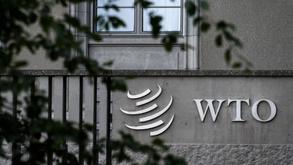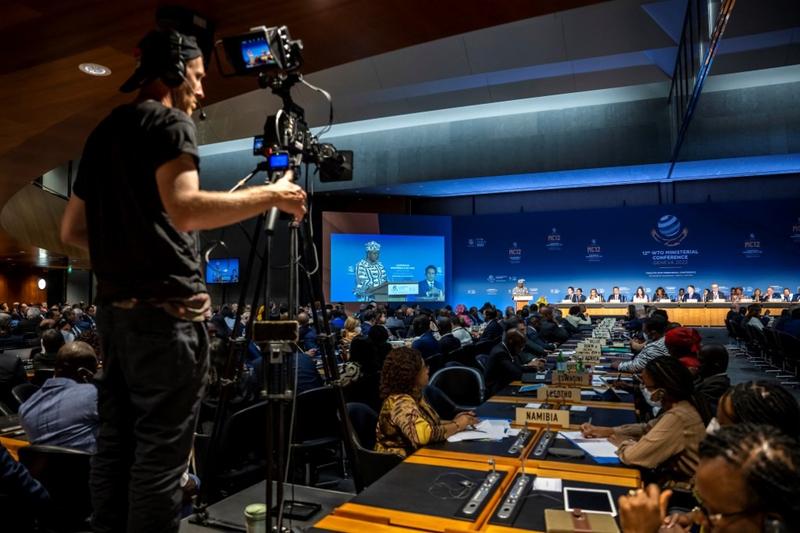Experts weigh impact of headwinds, say economic globalization may gain
 In this Sept 21, 2018 photo, a sign of the World Trade Organization (WTO) is seen on their headquarters in Geneva. The WTO says slumping global trade should put policymakers on guard for a sharper slowdown if trade tensions continue. (FABRICE COFFRINI / AFP)
In this Sept 21, 2018 photo, a sign of the World Trade Organization (WTO) is seen on their headquarters in Geneva. The WTO says slumping global trade should put policymakers on guard for a sharper slowdown if trade tensions continue. (FABRICE COFFRINI / AFP)
The package of trade outcomes at the World Trade Organization's 12th Ministerial Conference-MC12-has added resilience to the multilateral trading system, injecting more confidence into economic globalization, experts said on Wednesday.
According to the MC12 decisions, developing members will be authorized to produce and export to other eligible developing members COVID-19 vaccines without the consent of the right holder for five years
As the world's largest developing country, China's proactive support to help secure relevant agreement has demonstrated its strong sense of responsibility and unwavering support for multilateralism, they said, adding stronger consensus is needed for the WTO to emerge from its current crisis.
ALSO READ: China contributes greatly to WTO's waiver of COVID jab patents
The MC12 was attended by trade ministers and other senior officials from WTO members in Geneva from June 12 to Friday. Extended from the originally planned four days to six days, it has achieved multilaterally negotiated outcomes on a series of key trade issues, including commitments on fishery subsidies, food security and e-commerce, and a partial waiver of intellectual property rights for COVID-19 vaccines.
"During the event, WTO members showed they cherish economic globalization, overcoming geopolitical divergence heightened by the conflict in Ukraine and resorting to cooperation rather than confrontation to jointly-address global problems," said Tu Xinquan, dean of the China Institute for WTO Studies at the University of International Business and Economics and WTO Chair at the university.
"Multilateralism and cooperation are the only way to deal with global challenges, especially as economic globalization hit headwinds from the pandemic, the geopolitical conflict and rising protectionism."
In an online statement on Tuesday, the Ministry of Commerce said hard-won MC12 achievements will boost confidence in the multilateral trading system, while demonstrating the determination of WTO members to cooperate and jointly deal with global challenges and propel world economic recovery.
ALSO READ: Supporting WTO for fair trade, cooperation
Zhou Mi, a senior researcher at the Chinese Academy of International Trade and Economic Cooperation in Beijing, said the MC12 outcomes on urgent global issues like fishery subsidies, pandemic response and e-commerce tariffs are important for global trade and investment to further develop at a time of increasing uncertainty.
He also said China's "principle-based flexibility" and constructive efforts are key factors for the formation of the multilateral agreement.
According to the MC12 decisions, developing members will be authorized to produce and export to other eligible developing members COVID-19 vaccines without the consent of the right holder for five years. They will also enjoy larger flexibility on the implementation of authorization, notification obligation and provision of appropriate remuneration to the right holders.
ALSO READ: WTO strikes global trade deals after 'roller coaster' talks
At a key stage of the negotiations, China, the world's largest developing country, announced it would forego the flexibility from the COVID-19 vaccine intellectual property right waiver for the deal to be reached.
 Official delegations listen to the speech of Nigerian Director General of the World Trade Organisation Ngozi Okonjo-Iweala, at the opening ceremony of the 12th Ministerial Conference at the headquarters of the World Trade Organization, in Geneva, on June 12, 2022. (MARTIAL TREZZINI / POOL / AFP)
Official delegations listen to the speech of Nigerian Director General of the World Trade Organisation Ngozi Okonjo-Iweala, at the opening ceremony of the 12th Ministerial Conference at the headquarters of the World Trade Organization, in Geneva, on June 12, 2022. (MARTIAL TREZZINI / POOL / AFP)
Despite the meeting's outcomes, analysts said WTO members must achieve stronger consensus to agree on a clear roadmap for the organization's reforms to inject vitality into the organization and propel economic globalization.
WTO Deputy Director-General Zhang Xiangchen told Chinese news outlet The Paper that without successful reforms to solve the structural and institutional problems of the WTO, it will be difficult to balance the interests of all parties amid increasingly complex global competition.
The paralysis of the WTO appellate body that undermines its ability to solve disputes remains a major crisis for the organization, and its decision-making mechanism also presents challenges to efforts for its reform, Zhang said.


